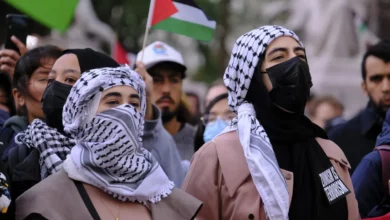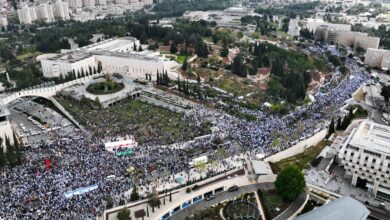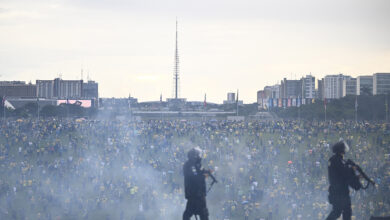Thousands of Egyptians roamed through the State Security headquarters in Nasr City for hours on Saturday night, reading and collecting classified material.
Zakareya Abdel Aziz, former head of Egypt’s judges club, arrived with representatives from the attorney general’s office at 9PM to receive documents, computer hard drives, tapes and shredded papers that the protesters had collected.
After demonstrating in front of the building for hours, a few protesters finally found themselves able to get in through a side door that was not heavily protected. The military then opened the main gate and allowed more protesters in.
Since Friday protesters have been targeting State Security buildings in an effort to dismantle the apparatus. “The capital of hell” is the expression many Egyptians use to refer to a body that has become known for using ruthless tactics against the people to protect the regime.
Protesters were able to access the State Security building in Alexandria on Friday after heavy clashes, while its premises in the Upper Egyptian city of Assiut were entered on Saturday. Protests continued in front of State Security’s building 6th October, where a fire that broke out Saturday morning damaged some documents.
After gaining entry to the building in Nasr City, protesters immediately formed a committee to collect material. They cordoned off the material collected and refused to leave, despite the army’s attempts to persuade them to, until representatives from the attorney general’s office arrived and collected it.
Documents found included full transcripts of phone calls made by reformer Mohamed ElBaradei; ElBaradei’s brother; journalist Hamdy Kandil; former general coordinator of the pro-democracy Kefaya movement, George Ishak; and general coordinator of the National Association for Change, Abdel Gelil Mostafa, among others.
There are also hacked emails and detailed accounts from inside opposition party meetings, including names of State Security officers planted in them.
Protesters also found documents that specify the number of votes in advance that each candidate would get in the parliamentary elections.
Files on political activists–including the 6 April opposition group founder Israa Abdel Fatah and its general coordinator Ahmed Maher–were found. But it was the files of Islamists, specifying subjects' attire and preferred sports, which contained the most details.
Salafis, who are among the people who suffered the most from State Security violations, prayed inside the building and chanted “God is great” and “State Security is the enemy of God.”
Protesters also found documents relating to the Alexandria church bombing on New Year’s Eve and the 1998 ferry accident.
After searching everywhere for prisoners that they believed were being held in the building, shouting “We will not leave until we free our detained brothers,” protesters found only empty cells containing torture devices. They also found a room in the basement full of weapons.
Delighted protesters were in a state of disbelief as they freely searched every room of a building which was until very recently Egypt’s most secret location.
“I used to make videos of this building from outside as I passed by, and now I’m inside it,” proclaimed a protester carrying classified documents.
The army searched protesters as they left the building to make sure no documents would be leaked.




